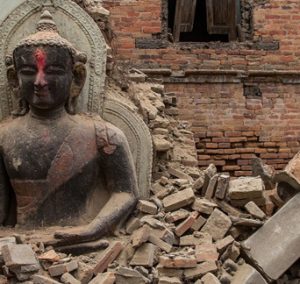Impact Statement
 This project will contribute substantially to understandings of the longterm sociopolitical and cultural impacts of natural disasters, especially in aid-dependent low-income countries where the state is weak. It will deliver impact in a range of contexts.
This project will contribute substantially to understandings of the longterm sociopolitical and cultural impacts of natural disasters, especially in aid-dependent low-income countries where the state is weak. It will deliver impact in a range of contexts.
First, the project will be of considerable interest to Governmental departments and international agencies engaged in delivering relief and development aid to countries in the global South, including Nepal. The research will encourage donors and policy-makers to consider the local political and historical contexts of future natural disasters and their responses to them and take more fully into account the discourses that take place in local languages, thus increasing the effectiveness of their interventions.
Second, the research will critically analyse the way in which national and international actors relate to one another in decision-making processes and policy making related to the protection, documentation and reconstruction of Nepal’s physical cultural heritage. It will analyse how this conversation is framed through domestic legislation and assess the extent to which laws reflect vernacular ‘heritage’ concepts and influence decisions about the allocation of international funds. This will be of interest to international organisations as well as local institutions and projects.
Third, the project will add to UK and international public understanding of the aftermath of the Nepal earthquake. The response to the British Disaster Emergency Committee’s Nepal earthquake demonstrated considerable sympathy for Nepal on the part of the British public. The project will therefore fill a significant gap in the public understanding of the aftermath of the Nepal earthquake, to the alleviation of whose effects the British public contributed with such generosity.
Finally, the project will aim to contribute to Nepali public understandings of the tumultuous series of events that followed in the wake of the disaster. It will do this by subjecting Nepali public and media discourse to non-partisan and critical analysis, and by placing these events in a deeper historical context through a comparison of the events of 2015 with disasters that struck Nepal during the 19th and 20th centuries. As such, the project, with its focus on processes and negotiations, will contribute to the understanding of the making of the collective memories that remain as the tangible and intangible legacies of a disaster: these are, after all, the sociopolitical contexts within which international interventions take place.
